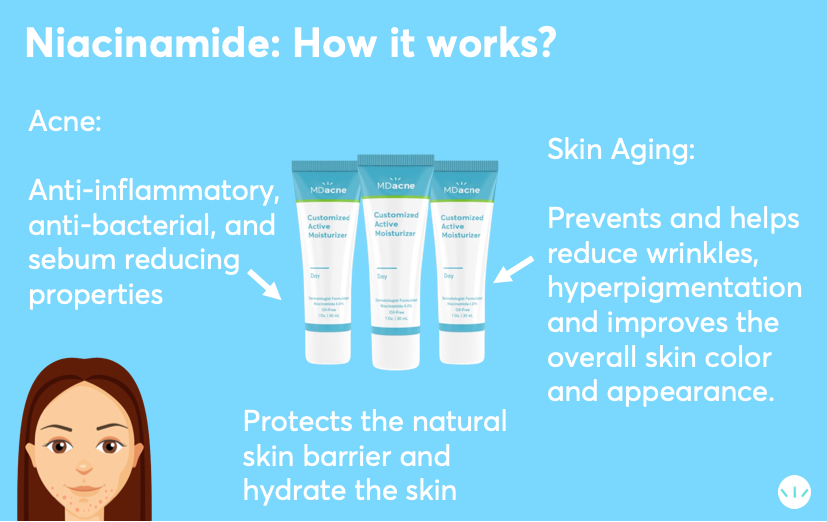Niacinamide: Best products according to Dermatologists

Niacinamide: The All-Star Vitamin for Clear, Healthy Skin
Niacinamide, also known as nicotinamide, is a form of vitamin B3 widely used for treating acne, rosacea, wrinkles, and hyperpigmentation. Known for its safety and effectiveness, it’s frequently recommended by dermatologists as a versatile skincare ingredient, backed by numerous studies in respected dermatological journals.
What is Niacinamide?
Niacinamide is a water-soluble vitamin B3 derivative found in many skincare creams and serums. Unlike acidic ingredients like AHAs or BHAs, niacinamide has a neutral pH, making it gentler on the skin. This makes it suitable for all skin types and a popular choice for those who want effective treatment without the irritation of stronger actives.
Benefits of Niacinamide
Niacinamide is celebrated for its ability to support skin health in multiple ways, making it a powerful addition to any skincare routine.
1. Acne Reduction
- Anti-inflammatory: Niacinamide soothes skin inflammation, reducing redness and helping heal post-acne marks.
- Sebum Reduction: By regulating oil production, niacinamide prevents clogged pores and reduces acne.
- Antibacterial: Studies show niacinamide’s antibacterial properties can reduce acne-causing bacteria, with research indicating it performs similarly to some topical antibiotics.
2. Anti-Aging Benefits
- Collagen Production: Niacinamide helps stimulate collagen, improving skin elasticity and minimizing fine lines.
- Hyperpigmentation: It can fade dark spots and brighten the skin, ideal for treating post-inflammatory hyperpigmentation in acne patients.
- Wrinkle Reduction: With regular use, niacinamide can smooth fine lines by strengthening the skin barrier.
3. Skin Barrier Protection
- Niacinamide supports the skin’s outer layer by enhancing ceramide production, which locks in moisture and protects against environmental irritants, improving skin resilience.
4. Rosacea Relief
- Niacinamide helps restore the skin’s barrier, reducing redness and soothing sensitivity, which can be especially beneficial for rosacea patients.
5. Hydration and Brightening
- By strengthening the skin’s barrier and preventing water loss, niacinamide enhances hydration, leaving the skin looking fresh and rejuvenated.

Niacinamide and the Skin Barrier
The skin barrier is the outermost layer that protects against irritants and keeps moisture locked in. Niacinamide is especially valuable in maintaining and repairing this barrier, making it essential for dry, sensitive, and acne-prone skin.
How Niacinamide Works Against Acne
Niacinamide works on multiple levels to prevent and treat acne:
- Reduces inflammation and redness in acne lesions
- Minimizes oil production, a common acne trigger
- Protects against bacterial overgrowth on the skin
Choosing Niacinamide for Your Skin Concerns
While niacinamide can be used alone, it’s especially effective in combination with other skincare actives. Here’s how to pair it with common ingredients:
- With Retinol: Niacinamide works well with retinol, helping to reduce retinol’s irritation and enhancing its anti-aging and anti-acne effects.
- With Vitamin C: Though both are powerful, it’s best to avoid using them at the same time. Use niacinamide in the morning and vitamin C at night or on alternate days.
- With Salicylic Acid: This pairing helps treat acne by exfoliating and reducing oil, without over-drying the skin.
Application Tips
For best results, use niacinamide after cleansing and before moisturizing. Apply a moisturizer with niacinamide or a niacinamide serum directly to clean skin. A concentration between 2-4% is often ideal, delivering results without the irritation that higher concentrations can sometimes cause.
Common Questions about Niacinamide
Does Niacinamide Cause Purging? No, as niacinamide doesn’t increase skin cell turnover, it typically won’t cause purging.
Can Niacinamide Be Used on Sensitive or Dry Skin? Yes, niacinamide is suitable for sensitive and dry skin, particularly in cream form and in lower concentrations.
Can Niacinamide Be Used During Pregnancy? Yes, niacinamide is generally considered safe during pregnancy and breastfeeding, making it a great alternative to retinoids.
Is a higher concentration better? Not necessarily. Studies suggest that 2-4% niacinamide provides optimal benefits. Higher concentrations (like 10%) can cause irritation, especially in sensitive skin.
Best Niacinamide Products for Acne-Prone Skin
When selecting niacinamide products, opt for those designed for acne-prone skin, ideally in a cream formulation. Serums often contain oils that can clog pores, so cream-based niacinamide products, like those in the MDacne system, can be a better choice.
Conclusion
Niacinamide’s versatility makes it a skincare superstar. From reducing acne and boosting hydration to diminishing wrinkles and brightening skin, it’s a powerful ingredient that works well for all skin types and can be seamlessly integrated into any skincare routine. For acne-prone individuals, niacinamide, combined with targeted actives like benzoyl peroxide or salicylic acid, can provide a clear path to healthier, more radiant skin.
References:
The role of nicotinamide in acne treatment. Dermatol Ther. 2017 Sep;30(5).
To find the right acne treatments for your unique skin, take the free skin assessment by clicking here.


